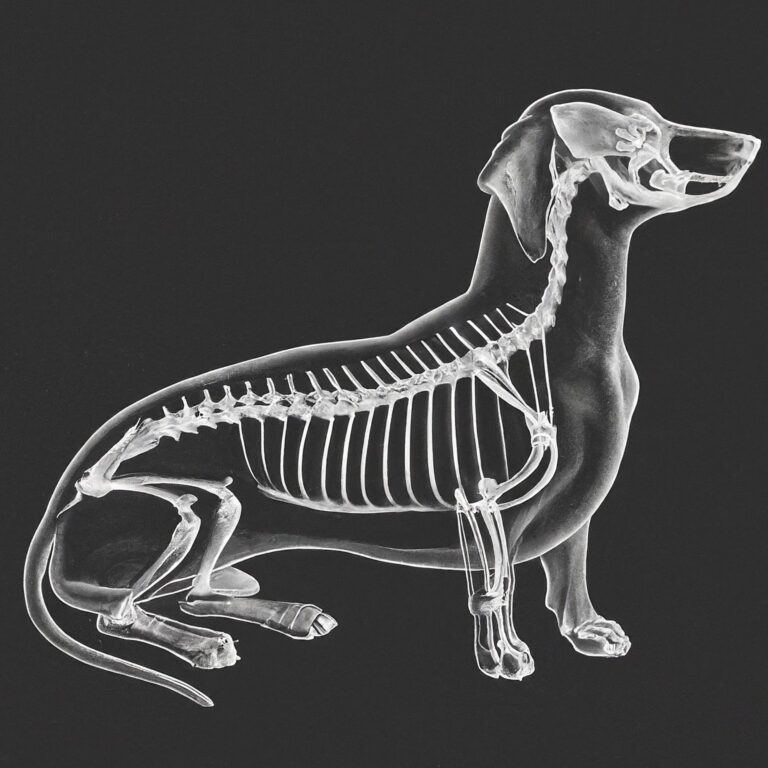
Understanding Intervertebral Disc Disease (IVDD) in Dogs
Intervertebral Disc Disease (IVDD) is a common spinal condition affecting dogs, particularly those with long backs or short legs, such as Dachshunds, Beagles, and Corgis.
IVDD occurs when the intervertebral discs, the cushions between the vertebrae in the spine, degenerate or herniate, leading to pain, nerve damage, and in severe cases, paralysis.
Understanding the causes, symptoms, treatment, and prevention of IVDD is crucial for dog owners to ensure their pets’ well-being.

Causes of Intervertebral Disc Disease
- Genetics: Certain breeds are predisposed to IVDD due to genetic factors. Breeds like Dachshunds have a genetic predisposition to the condition
- Age: As dogs age, their intervertebral discs degenerate, making them more prone to herniation
- Obesity: Excessive weight puts additional strain on the spine, increasing the risk of disc degeneration
- Trauma: Accidents or trauma to the spine can cause sudden disc herniation
- Activity Level: Activities that involve jumping or twisting, such as playing fetch or navigating stairs, can increase the likelihood of disc injury.
Symptoms of Intervertebral Disc Disease
- Back Pain: Dogs with IVDD may exhibit signs of discomfort or pain in their back, which can manifest as reluctance to move, crying out when touched, or a hunched posture.
- Weakness or Paralysis: As the condition progresses, dogs may experience weakness or even paralysis in their hind limbs due to nerve compression.
- Loss of Coordination: IVDD can affect a dog’s coordination, leading to stumbling, wobbliness, or difficulty walking.
- Decreased Appetite: Pain and discomfort associated with IVDD can cause a loss of appetite in affected dogs.
- Incontinence: In severe cases where the spinal cord is severely compressed, dogs may lose control of their bladder or bowels.

Treatment of Intervertebral Disc Disease
- Conservative Management: Mild cases of IVDD may be treated with rest, pain medications, anti-inflammatories, and muscle relaxants to alleviate symptoms.
- Physical Therapy: Rehabilitation exercises and physical therapy can help strengthen the muscles supporting the spine and improve mobility.
- Surgery: In more severe cases or when conservative treatments fail to provide relief, surgical intervention may be necessary to remove the herniated disc material and relieve pressure on the spinal cord.
- Supportive Care: Dogs recovering from IVDD may require supportive care, including assistance with mobility, bladder expression, and wound management post-surgery.
Prevention of Intervertebral Disc Disease
- Maintain a Healthy Weight: Obesity is a significant risk factor for IVDD, so ensuring your dog maintains a healthy weight through proper diet and exercise is crucial.
- Avoid High-Impact Activities: Limit activities that put strain on the spine, such as jumping from heights or vigorous play that involves twisting motions.
- Use Caution with Stairs: Minimize the use of stairs, especially for breeds prone to IVDD, or provide ramps to reduce strain on the spine.
- Regular Veterinary Check-ups: Regular veterinary exams can help identify early signs of IVDD and allow for prompt intervention.
- Genetic Screening: For breeds predisposed to IVDD, consider genetic screening before breeding to reduce the risk of passing on the condition to offspring.
In conclusion, Intervertebral Disc Disease is a significant health concern for dogs, particularly those with specific genetic predispositions. By understanding the causes, symptoms, treatment options, and preventive measures, dog owners can take proactive steps to minimize the risk of IVDD and ensure the well-being of their beloved pets.
Early detection and intervention are crucial in managing this condition effectively and improving the quality of life for affected dogs.
If you suspect your pet is ill, immediately call your veterinarian. For health-related inquiries, always consult your veterinarian as they have examined your pet, know the pet’s health history, and can make the best recommendations for your pet.
